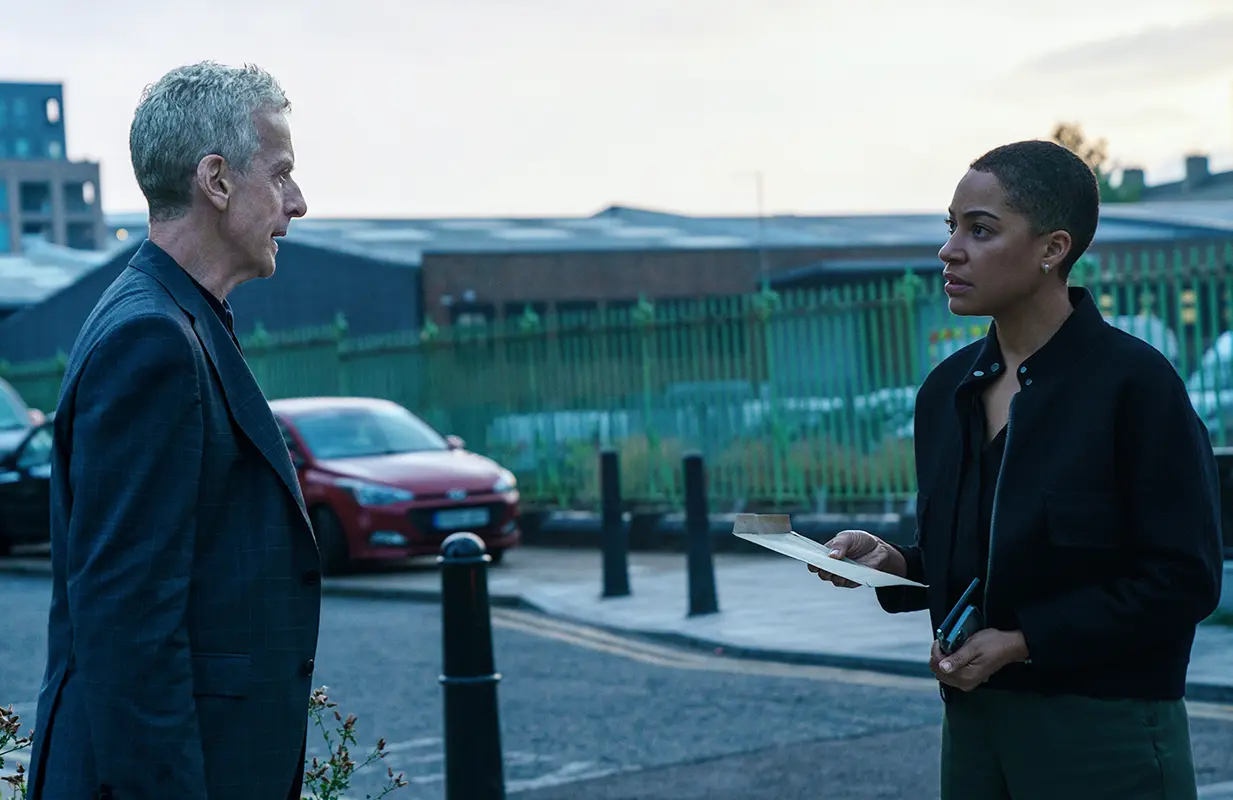Despite Its Title, There's Nothing Generic About Criminal Record
-
 Peter Capaldi and Cush Jumbo in Criminal Record (Photo: Apple TV+)
Peter Capaldi and Cush Jumbo in Criminal Record (Photo: Apple TV+)The television landscape is replete with forgettable show titles, but few are as bland as Criminal Record. The name reveals nothing about the contents of the Apple TV+ series, beyond indicating that it's a crime drama, or reflects the fact that it's a two-hander between Cush Jumbo and Peter Capaldi, who play police detectives on opposite sides of a murder investigation. And it certainly doesn't do justice to the thriller's unique willingness to confront police corruption head-on, something that instantly sets Paul Rutman's drama apart from the many shows that prefer to glorify the criminal justice system.
From the outset, Criminal Record establishes itself as a different kind of police procedural, one less defined by a horrific crime than the relationship between Detective Sergeant June Lenker (Jumbo), a young investigator eager to make a difference, and Detective Chief Inspector Daniel Hegarty (Capaldi), a seasoned veteran concerned with maintaining his reputation, above all else.
When an anonymous caller claims police nabbed the wrong guy in a decade-old murder investigation, June digs into the case file; the search leads her to the original investigator, Hegarty, but it's immediately clear that he's not interested in helping her get to the bottom of the caller's claim. Rather, he's dismissive of the man he put behind bars at the time, Errol Mathis (Tom Moutchi), referring to him as "the poor man's O.J.," and actively stands in the way of June's effort. As the season progresses, June builds a case for Mathis' innocence — and, by extension, Hegarty's misconduct — while the more senior detective works behind the scenes to protect his legacy and blow up her career.
Hegarty is, without a doubt, a crooked cop. He tells his old crew (known as "the Sixty-Twos") to "cover [their] backs" by destroying any lingering evidence they may be holding on to, uses his influence in the department to subject June to "random" performance checks, and manipulates evidence to suit his needs. With his gravelly voice and leering gaze, Capaldi makes for an excellent antagonist, but even in Hegarty's most sinister moments, he never tips over into caricature. This is a man who believes he's doing the right thing — the problem is that his version of "right" belongs to an earlier, abusive era of policing.
Though she initially takes on the familiar role of the justice-seeking detective, June proves just as complex as Hegarty. As a Black woman in London's predominantly white, male police force — it's no surprise that June's strongest ally in the department is another Black woman, DC Chloe Summers (Dionne Brown) — June is more attuned to the problems plaguing the institution than most of her colleagues, yet she lacks the power to enact change in any meaningful way.
June prefers to shrug off the inherent conflict between the various parts of her identity, but she's constantly reminded of it, whether she's speaking to those affected by the murder ("Tell me, what's a nice woman like you doing in the police?" asks Mathis' mother Doris, played by Cathy Tyson) or colleagues including DS Kim Cardwell (Shaun Dooley), one of Hegarty's Sixty-Twos, who purposely misidentifies June and Chloe, the only women of color reporting to a crime scene, as part of a "little joke." It's in moments like these that Jumbo does her finest work: She simmers with a quiet rage as June, left with no other options, attempts to ignore their comments and get on with the job.
As June and Hegarty's conflict escalates, Criminal Record exposes the moral rot at the center of the police department. It's everywhere you look: in the thinly veiled bigotry from Hegarty and Cardwell, who prize arrests above due process; in the system of gentlemen's agreements and quid pro quo that the old guard continues to use to their benefit; in the way June is subtly punished for noting inconsistencies and mistakes in the original investigation. Over time, the murder itself becomes less central to the show than larger questions about whether a centuries-old institution built on a bedrock of racism, sexism, and homophobia is capable of redemption, and what that process may look like from the inside.
In doing so, Rutman complicates the typical good cop/bad cop story. Underneath June and Hegarty's clash of ideologies and identities rests a timely reminder that it takes more than noble intentions to fight crime in a corrupt system — especially when that system is explicitly designed to provide justice to some, and deny it to others.
Criminal Record premieres with two episodes Wednesday, January 10 on Apple TV+. Join the discussion about the show in our forums.
Claire Spellberg Lustig is the Senior Editor at Primetimer and a scholar of The View. Follow her on Twitter at @c_spellberg.
TOPICS: Criminal Record, Apple TV+, Cush Jumbo, Paul Rutman, Peter Capaldi